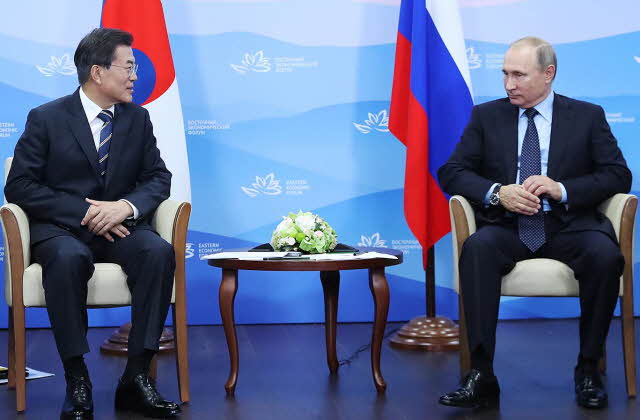이 웹사이트는 제19대 대통령 임기 종료에 따라 대통령기록관이 「대통령기록물 관리에 관한 법률」에 의해 이관받아 서비스하는 대통령기록물입니다. 자료의 열람만 가능하며 수정 · 추가 · 삭제는 불가능합니다.
다만, 「개인정보보호법」에 의하여 개인의 정보를 보호받기 원하시는 분은 관련 내용(요청자, 요청내용, 연락처, 글위치)을 대통령 웹기록물 담당자(044-211-2253)에게 요청해 주시면 신속히 검토하여 조치해 드리겠습니다. 감사합니다.
SPEECHES & REMARKS
BRIEFINGS

President Moon Jae-in, who is visiting Vladivostok, Russia, to attend the Eastern Economic Forum, met with Russian President Vladimir Putin today at a conference room in the Far Eastern Federal University. They held a one-on-on and extended summit from 1:35 in the afternoon.
Also attending the summit from the Korean side were Deputy Prime Minister and Minister of Strategy and Finance Kim Dong-yeon, Minister of Foreign Affairs Kang Kyung-wha and Chairman of the Presidential Committee for Northern Economic Cooperation Song Young-gil as well as Cheong Wa Dae Second Deputy Director of National Security Nam Gwan-pyo and Senior Secretary to the President for Public Communication Yoon Young-chan. Participating from the Russian side were Deputy Prime Minister and Presidential Envoy to the Far Eastern Federal District Yury Trutnev, Minister of Foreign Affairs Sergey Viktorovich Lavrov, Presidential Foreign Policy Aide Yuri Ushakov and Minister for Development of the Russian Far East Aleksandr Galushka.
President Putin welcomed President Moon and his delegation, thanking him for attending the Eastern Economic Forum. He also said he was pleased to have a chance to discuss mutual concerns, including the North Korean nuclear issue. He noted a 60 percent increase over the past six months in bilateral trade that had dropped approximately 16 percent last year, expressing satisfaction with the statistic.
President Moon said he was grateful to President Putin for inviting him as a guest of honor to the Eastern Economic Forum. Recalling his meeting with the Russian President at the G20 Summit in Germany, President Moon said he felt close to him after repeated meetings and telephone calls between them in a short period of time. Notably, he mentioned that Russia’s New Eastern Policy being pushed by President Putin and Korea’s New Northern Policy appear to envision the same dream, stressing the possibility that Korea would be the optimal partner for Russia in the development of the Russian Far East and the promotion of regional prosperity and peace.
During their one-on-one summit that lasted for an hour and a quarter, the two heads of state came to an agreement to advance Korea-Russia relations into a strategic partnership in the genuine sense.
The two leaders agreed to actively push ahead with economic exchange projects to increase total trade between the two nations to US$30 billion and the number of annual people-to-people exchanges to more than 1 million by 2020, the year marking the 30th anniversary of the establishment of diplomatic ties between Seoul and Moscow.
Mentioning the North`s recent sixth nuclear test, President Moon requested Russia`s role in resolving the problem. Saying that President Putin and Chinese President Xi Jinping were the two leaders who could put an end to the North`s provocative acts, the President called on the two leaders to play an enhanced role in making the North quit its nuclear and missile provocations. Underscoring the need to further bolster the intensity of the U.N. Security Council sanctions to bring it back to the dialogue table, the President requested Russia`s cooperation, including the efforts to cut off oil supplies to the North.
In response, President Putin said that the North would not give up its nuclear program intended to protect its security no matter how tough the pressure was, adding that his country`s annual oil exports to the North reached a meager amount of about 40,000 tons. Saying that Russia also opposed and denounced the North`s nuclear development, however, President Putin noted that he was concerned that cutting the oil supply could harm the general public, like people in hospitals. In addition, President Putin said that South Korea and Russia were on the same page with regard to the North`s nuclear development, adding that he would take a greater interest in how to bring the North to the negotiating table.
In the extended summit, the two leaders were briefed about the result of the Korea-Russia joint committee meeting on the economy held earlier. The joint committee agreed to form a Korea-Russia working group to seek a Korea-Eurasia free trade agreement and requested that Russia actively support the signing of such an FTA at the meeting of prime ministers of the five Eurasian Economic Commission countries, which is going to be held in October. In addition, the committee also agreed to restore consultation channels and resume joint research projects on the trilateral cooperative projects among the two Koreas and Russia such as the construction of the gas pipeline and electric power network as well as the connection between the Trans-Korean Railway and Trans-Siberian Railway.
During the one-on-one summit, President Moon had actively sounded out President Putin’s intention to support a Korea-Eurasia FTA, and he said he agreed in principle.
President Moon said, however, that so far Korea-Russia cooperative relations had been mostly limited to the effort to promote trilateral cooperation among the two Koreas and Russia. The President continued that since poor inter-Korean relations tended to hold back even Korea-Russia relations, it would be desirable to aim for and promote bilateral cooperation and, then, to allow North Korea to participate when inter-Korean relations improve.
In the joint committee, it was also decided to encourage Korean companies to support infrastructure projects in the Russian Far East and set up a Far East financial initiative worth about US$2 billion over the next three years in cooperation between Korea Electric Power Corp. and Russia. For that purpose, the committee agreed to carry out joint research beforehand on potential Korea-Russia power grid projects. The committee also concurred on various ways to achieve economic cooperation, including holding a Korea-Russia regional cooperation forum for the first time in 2018 to promote collaboration between the district government in the Russian Far East and local governments in Korea.



